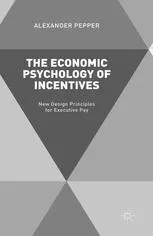The Economic Psychology of Incentives: New Design Principles for Executive Pay
4.5
Reviews from our users

You Can Ask your questions from this book's AI after Login
Each download or ask from book AI costs 2 points. To earn more free points, please visit the Points Guide Page and complete some valuable actions.Related Refrences:
Welcome to a comprehensive exploration of executive compensation through a psychological lens in "The Economic Psychology of Incentives: New Design Principles for Executive Pay." This book delves into the intricacies of how financial incentives impact executive behavior, decisions, and overall company performance. Designed for both scholars and practitioners, this work provides a nuanced understanding of compensation structures and the psychological factors that influence their effectiveness.
Detailed Summary of the Book
"The Economic Psychology of Incentives" challenges the traditional economic assumptions that underlie executive pay systems. It argues that these systems often fail to account for the complex psychological factors at play, such as intrinsic motivation, fairness perceptions, and risk aversion. The book is organized into several thematic sections. It begins with an overview of current executive pay practices and the economic theories that support them. It then explores the psychological dimensions—highlighting cognitive biases and social influences—that executives face.
The middle chapters delve into empirical research and case studies, revealing the disconnect between existing compensation models and actual executive behavior. By examining real-world examples, the book demonstrates how incentive systems can misalign with organizational goals, ultimately hindering performance. The concluding sections offer innovative design principles aimed at creating more effective and psychologically attuned pay structures, proposing mechanisms like deferred pay, stock options, and team-based rewards.
Key Takeaways
- The Complexity of Motivation: Financial incentives are powerful but their effectiveness is contingent on psychological factors beyond mere economic considerations.
- Intrinsic vs Extrinsic Rewards: Understanding the balance between intrinsic motivations and extrinsic rewards is crucial in designing effective incentive systems.
- Behavioral Economics and Incentive Design: Insights from behavioral economics can offer new directions for structuring executive compensation that align better with human behavior.
- Equity and Perception: How fairness and equity perceptions impact executives' reception to various incentive structures.
- Long-Term vs Short-Term Focus: Encouraging a balance between short-term results and long-term strategic goals in incentive systems.
Famous Quotes from the Book
"While money is a great motivator, it is not the sole lever of motivation."
"Compensation design often ignores the irrationalities present in human behavior, leading to ineffective solutions."
Why This Book Matters
The significance of "The Economic Psychology of Incentives" lies in its interdisciplinary approach. By merging economics and psychology, it offers a more complete understanding of how incentives impact executive behavior. This perspective is crucial as organizations face increasing scrutiny over pay disparity and fairness, demanding more accountable and effective compensation structures.
For business leaders, human resources professionals, and compensation committees, this book serves as a valuable resource to rethink existing paradigms and implement incentive systems that are not only economically sound but also psychologically gratifying. The book’s insights are backed by empirical data, adding credibility and practical relevance to its innovative proposals.
In a world where maximizing shareholder value often overshadows ethical considerations, "The Economic Psychology of Incentives" provides a balanced perspective that aims to harmonize business goals with responsible leadership.
Free Direct Download
You Can Download this book after Login
Accessing books through legal platforms and public libraries not only supports the rights of authors and publishers but also contributes to the sustainability of reading culture. Before downloading, please take a moment to consider these options.
Find this book on other platforms:
WorldCat helps you find books in libraries worldwide.
See ratings, reviews, and discussions on Goodreads.
Find and buy rare or used books on AbeBooks.
1192
بازدید4.5
امتیاز50
نظر98%
رضایتReviews:
4.5
Based on 0 users review
"کیفیت چاپ عالی بود، خیلی راضیام"
Questions & Answers
Ask questions about this book or help others by answering
No questions yet. Be the first to ask!














